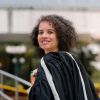
Stéphanie Manuel
- Course: MA Postcolonial Literary and Cultural Studies
- Graduation: 2023
- Nationality: Mauritian
Tell us a bit about yourself?
I am from Mauritius, an Indian Ocean island nation, and my undergrad in English Studies was done at the University of Mauritius. Prior to that, I also studied law and management and worked in administration and human resources for quite a few years. After taking a gap year in France, I decided to make a career change to fulfil a long-held aspiration of studying English literature.
Why did you choose to study your particular course and why did you choose the University of Leeds?
Living in a multicultural country with deep historical wounds, postcolonialism brings to the fore pressing issues of inequality and the need to work on justice and reconciliation.
I developed my interest in postcolonial studies during my undergrad course. For instance, by engaging with the various facets of Mauritian multilingualism, namely the Mauritian Kreol, I was better able to grasp the impact of colonialism on our linguistic space, and analyse language ideologies that perpetuate social hierarchy and marginalisation. I am also interested in questions of identity and their cultural representations across periods, forms and contexts. Pursuing further studies in this field was thus the natural thing to do.
Studying at a British university has been one of my dreams since I started looking at brochures of nice, sprawling campuses in my high school library. However, money has been an important hurdle that prevented me from achieving this dream.
I have heard a lot about the high quality of courses delivered by the School of English at Leeds and decided to send my application while looking for funding. Coming to Leeds finally became possible thanks to the Tetley and Lupton scholarship.
What is it that makes you passionate about your area of study?
Postcolonial studies are so intricately linked to the social and historical fabric of my country, to my own personal history and that of my people.
But here at Leeds, I have also been privileged to connect with people from around the world – China, Japan, Iran, India, Hong Kong, the US, Luxembourg, Morocco to name a few – and listen to their personal stories. I am particularly fascinated by those that relate to postcolonial struggles: Hearing stories of people who actively participated in mass protests against their governments is often more inspiring than reading scholarly material or news articles.
What aspects of the course do you enjoy the most?
Postcolonial studies are mostly about addressing the cultural, economic and political legacies of colonialism, and the different modules I have taken at Leeds helped me to think critically about these issues.
The rich variety of subject areas and extensive resources at Leeds also allow me to pursue my research in a specialist field that is growing in significance in my home country – disability studies. I am still so amazed by the ease of requesting the purchase of a book that is not available at the library and then getting it after a mere few weeks.
Have you worked closely with a particular tutor or member of the University’s academic staff? Tell us about that experience.
All my tutors have been super helpful in guiding me in my studies. They are really generous in sharing their experiences and providing advice beyond the course. I am particularly grateful to Prof. Graham Huggan and Associate Prof. Brendon Nicholls who encouraged me to get out of my comfort zone and build my confidence as a scholar in practical ways, such as participating in conferences. My personal tutor, Prof. John Whale, was also very supportive in helping me navigate university life as an international student.
What activities outside of your studies were you involved in?
The University of Leeds has so much to offer that it was quite difficult to choose where to get involved.
I am a volunteer for the Leeds University Library Galleries where I met great arts people, and I am the Course Representative for the School of English Student-Staff Forum. I moreover participate in events organised by the Catholic Society. I am also part of the MA conference organising team. During the first term, I attended some of the activities (The Hollies and Formby beach) of the Conservation Volunteers.
And finally, I greatly enjoy the research groups, namely, the Postcolonial Research group where I can delve deeper into a particular postcolonial topic with academics and postgraduate students beyond my course.
What do you plan to do when you’ve finished your course, and how do you think the skills and knowledge you’ve developed so far at Leeds will help with these plans?
I am planning to do a PhD after my course, and hopefully contribute to the development of my country. Leeds has allowed me to improve my independence and confidence as a scholar as well as my communication and research skills.
What would you say to students thinking about studying your course?
The University of Leeds offers an inclusive, diverse and supportive environment and the School of English feels like home. There’s something for everyone, and it’s truly a space of growth and happiness at both a personal and academic level. Take the plunge!
What does Leeds as a city have to offer students?
Leeds is vibrant and safe for students. As an art and music lover, I feel spoiled by the abundance of events and live music happening in the city. So far, I have indulged in live jazz performances, opera, musicals and some impressive organ recitals at the Leeds Cathedral.
Leeds is also not far from the Yorkshire Dales which has great hiking trails and beautiful towns.

